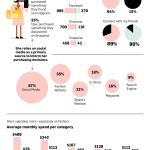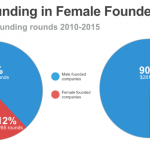Actually, Women Do Ask For Raises As Often As Men–They Just Don’t Get Them
Almost a decade ago, Carnegie Mellon professors Sarah Laschever and Linda Babcock found that men ask for raises and promotions four times more than women do. Their research has now been cited so often that it’s just about become popular wisdom.
But a new study by researchers at London’s Cass Business School, the University of Warwick, and the University of Wisconsin analyzed a random sample of just over 4,500 workers across 800 employers in Australia and found something surprising: Women aren’t afraid of asking for raises and promotions. Women ask as often as their male counterparts, but they get what they want less often—25% less often, in fact.
New Research, New Reactions
Using a detailed series of questions, the researchers tackled two stubborn yet widespread beliefs surrounding the gender pay gap. The first—that women aren’t as ambitious or pushy as men—was found to have no basis in the study (which focused on Australia, because it’s the only country that gathers data on employees’ raise requests). The second—that women are more afraid of upsetting their bosses or hurting their relationships with their employers—was also thrown out.
These findings shift the burden from professional women to the companies that employ them. These days, it appears that closing the pay gap may be less about changing the ways women have been raised to understand the value of their work and more about how their employers react to women’s improving negotiating skills.
Social and political climates may have something to do with that shift. Earlier this year, the World Economic Forum (WEF) issued its annual report on the gender gap, and it didn’t just fall into the void. Just last month, in Iceland, where women earn an average of 14% less than men, women left their desks at 2:38 p.m., leaving their workdays 14% unfinished—right at the point where that pay discrepancy kicked in.
Taking to the streets and leaving desktops unwatched might not catch on in the U.S., but the metaphor is instructive. The WEF report looked at 144 countries and measured the gaps not only in economic opportunities but also in access to education, health care, and political representation. The U.S. ranked 45th on the list. At the current rate, researchers believe, women worldwide are not going to see these gaps close completely in their lifetimes—it will take 170 years at the current rates of progress worldwide.
But as one of the coauthors of the Cass School study points out, that research “potentially has an upside. Young women today are negotiating their pay and conditions more successfully than older females,” says Amanda Goodall, “and perhaps that will continue as they become more senior.” Women aren’t just negotiating more aggressively than in the past. They’re now more aware that they aren’t being rewarded equitably for doing so.
Knowledge is power, in other words, and it spreads almost exponentially over time. It’s findings like Goodall’s and her fellow researchers’ that don’t just document a problem but empower those who are hurt by it to demand change in the right places.
What Working Women Can Do Starting Now
With that in mind, there are a few steps women can take right away to begin pressing to earn what they’re worth.
Know your own value. Do the research and honestly assess your talents, skills, and experiences—because your boss won’t do this for you. Get the data on pay for the same or comparable jobs in your community, so you have objective (or at least less subjective) information with which to build a case for yourself.
I was so proud when a former intern of mine was offered a position at a major tech company and asked me what to do before accepting. She’d done her research, and the firm’s salary offer was toward the top for comparable positions. Still, she said, “I know I should negotiate something.” She was right; I advised her to think about non-salary compensation that she’d value, and she ended up getting her new employer to pay for her move.
Be your own advocate. Investigate the culture of your company, how decisions are made, and what’s valued most (and least). It’s one thing to do the “hard” research—salary benchmarks and so on—and another to get a “softer,” qualitative feel for an employer’s mind-set around compensation. This holds true as much for a company you’re considering working for as one you already do work for.
Go on Glassbreakers to get or become a mentor, and LinkedIn to connect with others in your field. Read reviews on Fairygodboss. Talk to trusted coworkers. Reach out to past employees who’ve since moved on, and ask their experiences. Then use your research to help you speak up—not just about your salary offer or about that promotion coming up, but about ways in which women’s leadership can add value to their bottom line.
Outside of work, too, it’s important for professional women to understand policymakers’ priorities; change happens in both big and incremental ways. The keys to more opportunities and important social shifts can often be found in the details of all kinds of bills, from the municipal to the federal level.
Face the chaos with courage. When I left my first CEO position, a member of the board asked me what I thought was one of most important qualifications for the job. Courage was the answer that came out of my mouth before I had a chance to think. I still believe that courage is what it takes to act in the midst of chaos and against long odds that you shouldn’t have to surmount but are forced to. It takes courage, too, to own the responsibility for fixing something, even if you don’t have total authority to—and to make decisions even when you can’t guarantee the outcomes.
It’s possible to see the latest research as different fragments of the same picture. Women have changed—even in the past decade—but the world at large has not, and 170 years is too long to wait for parity. The U.S. has just fallen short of electing its first female president, but it’s worth remembering that Hillary Clinton won the popular vote. That means that a majority of American voters still wanted a woman to represent them, and that desire doesn’t vanish.
Whatever the next four years turn out to look like, it’s clear that the social tide is turning. Younger women are asking for their due when their older colleagues didn’t dare to (often as a result of wholly valid fears). It’s heartening to know that the data confirms what many of us have long hoped: Finally, women know their worth. Now it’s time for everyone else to catch up. Don’t worry—we’ll show you the way.
Fast Company , Read Full Story
(16)














